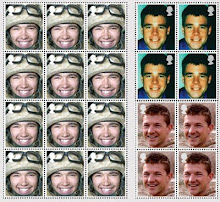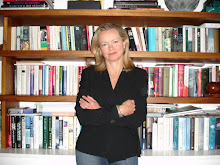Any journalist with more than a few years’ experience has a sad saga of plagiarism to tell. Not even the most august publications are immune from the practice, as we saw only yesterday with the resignation of New York Times business reporter Zachery Kouwe amid allegations he lifted material straight from a piece written two weeks earlier by a Wall Street Journal reporter.
This kind of blatant theft – plagiarism comes from the Latin verb: to kidnap - makes for a good headline and there was no surprise that prestigious Spanish newspaper El Mundo chose to splash the story of the NYT investigation on the Media section of its website. El Mundo used Spanish news agency EFE copy and ran it without comment.
Good then, to see El Mundo alerting its readers to this shameless breach of protocol by the venerable Gray Lady. What a shame it failed to take this perfect opportunity to admit to an equally brash example of plagiarism on its own website earlier this week.
On Tuesday 16th February – Ramón Salaverría wrote a blog post which - loosely translated - was entitled “Plagiarism & What to do about it”. He explained that his Monday post - concerning the future of EFE - was lifted shortly after he published it – and practically verbatim – by the website of major Spanish daily El Mundo.
The story which follows is a cautionary tale about the swift rise of uncredited appropriation of original material in our global digital age. As the loud slamming of stable doors at the NYT shows, policing this piracy is practically impossible. It also highlights the frustrating impotence of individual originators in the face of powerful media organisations.
Ramón Salaverría is Professor of Journalism at Spain’s prestigious University of Navarre and is the academic behind the influential e-periodistas-weblog. He tweets at @rsalaverria.
Justifiably peeved, Ramón sent a tweet about the plagiarism - which, unsurprisingly, was swiftly retweeted around the Spanish-speaking Twitterverse. Less than an hour after the tweet – 140 characters which exposed the casual appropriation of a considered blog post by a respected journalist and commentator - the piece on the El Mundo website was markedly modified – in a patent attempt to differentiate it from Ramón’s original post.
However, it still contained no acknowledgement of the original source, nor any nod to the original author of the piece. The time of posting of El Mundo’s re-jigged version had also been mysteriously modified – to predate the original, expository tweet. Ramón tweeted about this back-tracking by the El Mundo website. He also noted that El Mundo was also flagging the NYT-WSJ plagiarism piece.
There is a silver lining to the black cloud of this story. Ramón’s story prompted an avalanche of indignant tweets, all expressing solidarity. On Wednesday afternoon, he finally received an apologetic telephone call from an El Mundo representative. Was this apology prompted by the Twitter backlash? Impossible to be sure but difficult to discount completely.
As I write, Ramón’s story has appeared elsewhere in the Spanish media; a couple of headlines reading: Salaverría accuses El Mundo of plagiarism. The use of that particular verb is, as he says himself, a question of nuance.
Salaverría is a journalism professional and the author of several key publications about online journalism and the future of news on the Internet. With this frank and expert eye on the media landscape, he recognises that he is not the first to have his intellectual property whisked away in this manner – nor will he be the last.
But as he expounds in his original blog post: we all know that the media are in full-blown crisis; the future is far from clear. Professor Salaverría firmly believes that this future depends upon the media – whether print or on-line - remaining a credible and trustworthy resource for their readers.
He echoes several other commentators’ pleas for a return to the criteria of excellence and – slightly scarily – refers his readers to a post he wrote six years ago – the substance of which remains: “pressing ‘delete’ does not necessarily mean rectification”.
skip to main |
skip to sidebar




from the frontline of photo-journalism & fine art
"Nonstop imagery is our surround, but when it comes to remembering, the photograph has the deeper bite....
In an era of information overload, the photograph..is like a quotation, or a maxim or proverb."
(Susan Sontag: Regarding the Pain of Others 2003)
In an era of information overload, the photograph..is like a quotation, or a maxim or proverb."
(Susan Sontag: Regarding the Pain of Others 2003)


@deejackson on Twitter

Queen & Country by Steve McQueen
The image above shows a detail from 'Queen & Country' by Iraq War Artist Steve McQueen. Find out more below & sign the petition for Royal Mail to issue the stamps in tribute to the fallen servicemen & women the project commemorates.
http://www.artfund.org/queenandcountry/Queen_and_Country.html
http://www.artfund.org/queenandcountry/Queen_and_Country.html

About Me
Dominique Jackson is a freelance writer & translator with more than 20 years’ experience of the Fourth Estate. She studied Modern & Medieval Languages at Magdalen College, Oxford and trained at Reuters News Agency after graduating.
She worked initially as a Foreign Correspondent, reporting from Latin America, South East Asia and Western Europe, and latterly, as a writer and editor on London’s Fleet Street. She is currently a columnist and blogger for the Mail Online RightMinds Debate project. Read her most recent articles here:
Dominique's work has also appeared in publications as diverse as the Guardian, the Spectator, the Financial Times, Marie Claire, Avenue Magazine, the Times Educational Supplement, the Volkskrant & the South China Morning Post.
My linguistic & editorial consultancy website can be found here: http://babelatbedlam.co.uk/
My latest project - raising awareness of Lewy Body Dementia and of elder and vulnerable adult abuse can be found here: http://ahappierending.blogspot.com/
My linguistic & editorial consultancy website can be found here: http://babelatbedlam.co.uk/
My latest project - raising awareness of Lewy Body Dementia and of elder and vulnerable adult abuse can be found here: http://ahappierending.blogspot.com/
